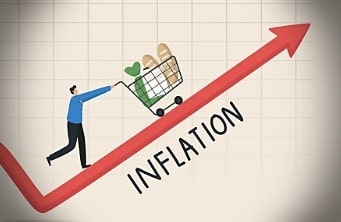India’s Consumer Price Index (CPI) inflation jumped 5.49 per cent in the month of September, up from 3.65 per cent in August, due to high base effect and weather conditions, the government said on Monday.
The year-on-year inflation rate, based on the All India Consumer Price Index (CPI), for the month of September was 5.49 per cent. Corresponding inflation rates for rural and urban areas were 5.87 per cent and 5.05 per cent, respectively.
The inflation rate based on the All India Consumer Food Price Index (CFPI) number was 9.24 per cent (provisional) for the month of September.
The housing inflation rate was 2.78 per cent, up from 2.66 per cent in August, for the urban sector.
According to the data provided by the Ministry of Statistics, the all-India electricity index and inflation for the month of September were 162.5 and 5.45 per cent, respectively.
"During the month of September, 2024, a significant decline in inflation is observed in pulses and products, spices, meat and fish and sugar and confectionery sub-group," the data showed.
According to experts, the rise in retail inflation is particularly in the aftermath of erratic monsoon patterns.
Apurva Sheth from SAMCO Securities said that the RBI had probably expected a hardening of inflation and that's why, it chose to hold on to the rates in the monetary policy announcement last week.
"It seems that RBI will take a cautious stance going ahead and will not be in a hurry into rate cuts like its global peers," Sheth added.
However, with core inflation still under control, the broader inflation narrative remains primarily food-driven, said analysts. Looking ahead, inflation is expected to average around 4.5 per cent for FY25, with RBI maintaining a cautious stance on monetary policy. The central bank is likely to wait for sustained evidence of easing price pressures before making any rate adjustments, said Arsh Mogre from Prabhudas Lilladher.




Mistake that benefits no one: World leaders react to Trump's 'reciprocal tariffs'
As US President Donald Trump signed an executive order on the so-called "reciprocal tariffs," the world reacted sharply against the decision, with some calling it a "mistake that benefits no one" while others called it a violation of Washington's obligations under the World Trade Organization (WTO).
Indian pharmaceutical exports get reprieve from Trump’s reciprocal tariffs
Because of the importance of India’s pharmaceuticals to US healthcare, those exports will get a reprieve from President Donald Trump’s reciprocal tariffs, according to the White House.
India stands less impacted by Trump tariffs than global peers: Industry
As US President Donald Trump announced reciprocal tariffs on dozens of countries, including India, industry experts said on Thursday that it appears India's export competitiveness to the US market stands far less impacted on a relative basis compared to global peers.
IAF pilot killed, another critical as Jaguar fighter jet crashes in Gujarat
An Indian Air Force (IAF) pilot lost his life, while another sustained critical injuries after their two-seater Jaguar fighter jet crashed near Gujarat's Jamnagar Airfield, the IAF confirmed on Thursday.
PM Modi emplanes for Thailand; to attend BIMSTEC summit
Prime Minister Narendra Modi on Thursday emplaned for Thailand on a state visit to attend the 6th BIMSTEC Summit, with his visit also set to bolster bilateral relations between New Delhi and Bangkok.
Tripura CM stresses promoting NE states' potential to attract investment
Tripura Chief Minister Manik Saha on Wednesday said that the development of the communication process and system has generated a lot of investment potential, and therefore, more emphasis should be placed on promotion to attract investors in all the northeastern states.
Tripura has 94,723 Lakhpati Didis; 93,425 women to get similar status soon: Minister
Among the 4,75,582 Self Help Group (SHGs) members in Tripura, 94,723 women emerged as ‘Lakhpati Didis’ through their engagement in various enterprising units and 93,425 more women would be ‘Lakhpati Didis’ soon, Social Welfare and Labour Minister Tinku Roy said.
Bhavan’s Little Learners celebrate annual programme
The Bhavan’s Little Learners, Bordowali celebrated annual programme and organised prize distribution ceremony here at Agartala Rabindra Satabarshiki Bhavan on Wednesday.